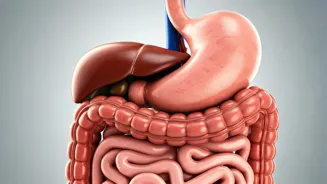Hydration is Key
Staying sufficiently hydrated is crucial for digestive health. It is recommended that individuals consume adequate water throughout the day to assist the digestive process.
Proper hydration ensures that the digestive system functions efficiently, preventing constipation which can lead to bloating and gas. Make a conscious effort to drink plenty of water, particularly before meals, to facilitate better digestion. This helps in breaking down food effectively and promotes the smooth movement of food through the digestive tract. Avoid sugary drinks, as they can exacerbate digestive issues. Water plays a vital role in maintaining the balance of fluids and electrolytes in the body, supporting optimal digestive function and minimizing discomfort.
Mindful Eating Habits
Practicing mindful eating can greatly impact your digestive health. This involves paying close attention to your meals and slowing down while you eat. Chewing your food thoroughly breaks down particles, helping digestion and decreasing the chances of gas production. Avoid eating quickly, as this can lead to swallowing air, which contributes to bloating and discomfort. Eating in a calm environment without distractions encourages better digestion. By being present during meals, you can also better gauge your body's fullness cues, preventing overeating that often triggers bloating. This technique enhances your overall eating experience and aids in digestion and lessens gas production.
Probiotic Power Boost
Probiotics, often found in fermented foods like yogurt and kimchi, are beneficial bacteria that can support your gut health. These bacteria contribute to a balanced gut microbiome, where the good bacteria keep harmful bacteria under control. This balance is key to preventing digestive issues such as bloating and gas. Consider incorporating probiotic-rich foods into your diet regularly or taking a probiotic supplement, but consult with a healthcare provider before starting any new supplement. These probiotics promote better nutrient absorption and help to break down food more efficiently, minimizing the production of gas. Probiotics are a natural approach to enhancing gut health and reducing discomfort.
Fiber Intake Strategy
Fiber is essential for digestive health, although it requires careful management. Soluble fiber, which dissolves in water, can assist with constipation and bloating, by adding bulk to your stool. Conversely, insoluble fiber can sometimes worsen bloating if not introduced gradually. To optimize fiber intake, aim for a balance of both types. Gradually increasing your fiber intake through foods like fruits, vegetables, and whole grains is vital to avoid digestive distress. Ensure you're drinking enough water, as fiber absorbs water, which aids in preventing constipation. Monitor your body's response to various fiber-rich foods and adjust your intake accordingly. A balanced approach ensures your gut health benefits from fiber without causing excessive bloating.
Avoid Trigger Foods
Certain foods are notorious for triggering bloating and gas. It is important to identify foods that cause you discomfort. Common culprits include high-FODMAP foods (fermentable oligosaccharides, disaccharides, monosaccharides, and polyols), which are carbohydrates that are poorly absorbed in the small intestine. These foods often ferment in the gut, causing gas and bloating. Some examples include onions, garlic, beans, and certain fruits. Keeping a food diary and noting symptoms can help identify problem foods. Once you've recognized your trigger foods, limiting or avoiding them can significantly reduce bloating. This proactive approach is essential for maintaining digestive comfort and well-being.
Herbal Remedies Support
Several herbal remedies have been shown to help alleviate bloating and gas. Peppermint, known for its antispasmodic properties, can relax the muscles of the digestive tract and reduce discomfort. Ginger can help speed up digestion and decrease the production of gas. Chamomile tea may also help soothe the digestive system and reduce inflammation. Other herbs like fennel and caraway have also been used to ease bloating. The key is to incorporate these remedies thoughtfully, as individual responses can vary. Consider consuming herbal teas or taking supplements in moderation to evaluate their effects. Always consult with a healthcare professional before starting any herbal treatment, especially if you have existing health conditions or are taking medications.
Gentle Exercise Benefits
Regular, gentle exercise can improve digestion and reduce bloating. Physical activity encourages the movement of food through the digestive tract, preventing constipation and reducing gas buildup. Light exercises like walking, yoga, or swimming are particularly beneficial. Exercise also helps to reduce stress, which can exacerbate digestive symptoms. Aim for at least 30 minutes of moderate exercise most days of the week. Remember to listen to your body and avoid strenuous activity immediately after meals. Regular exercise not only improves physical health but also promotes digestive health, creating a positive cycle of wellness. By incorporating exercise into your daily routine, you can actively combat bloating and improve your overall digestive comfort.












